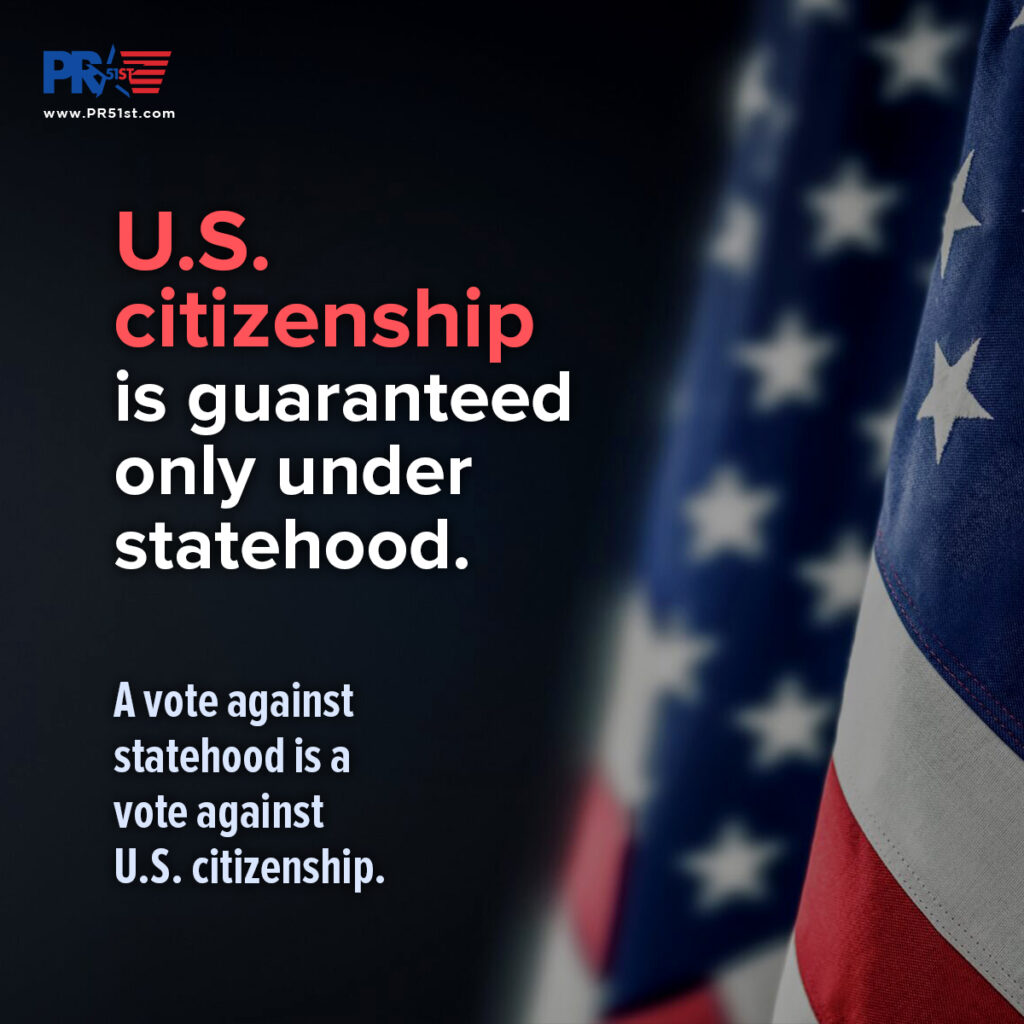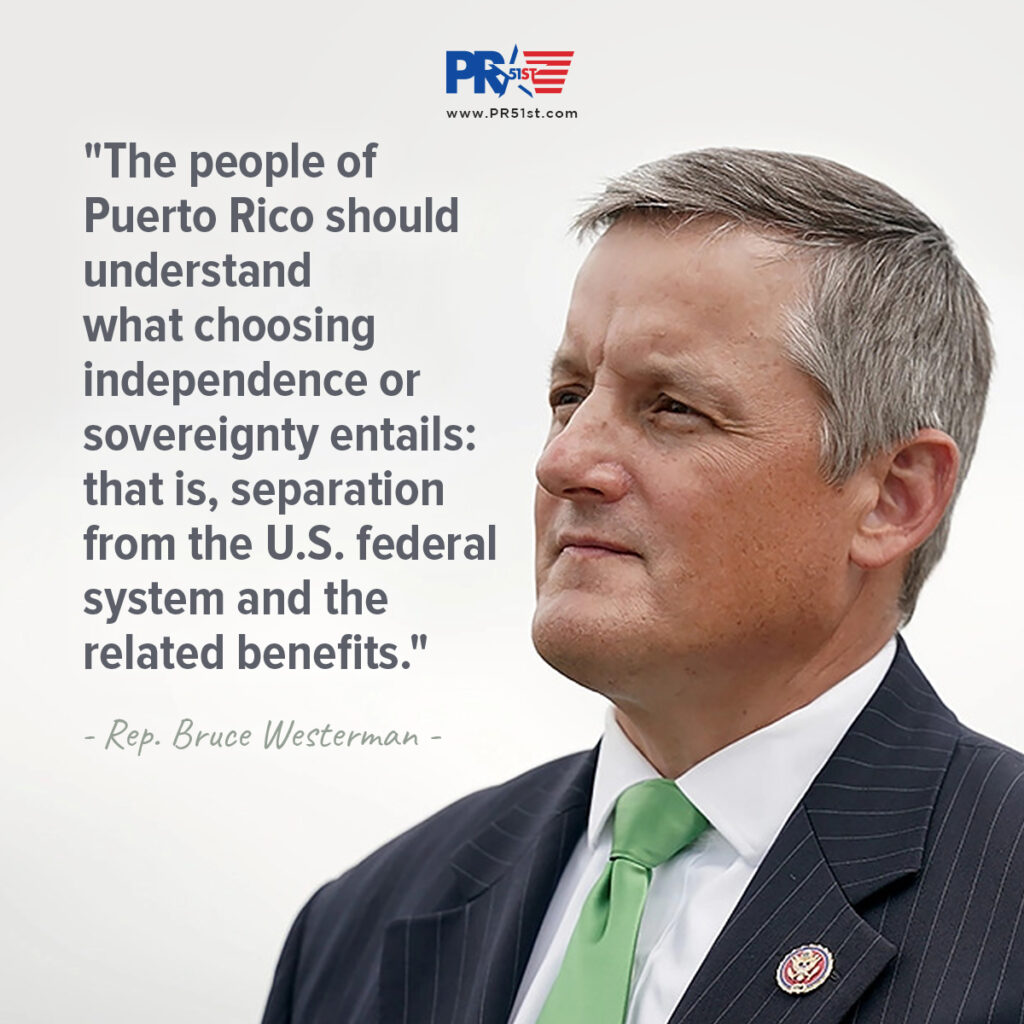One of the most important issues regarding Puerto Rico’s status is the question of U.S. citizenship.
Dennis Freytes wrote, “Please, clarify/qualify that most ‘statutory’ US Citizens born in the US Territory of Puerto have a non-permanent US Citizenship, even if they move to a State, because the basis or authority comes from the Territorial Clause, not the 14th Amendment. Also, PR 51st should understand that you are mentioning Laws and Codes that can be amended or revoked by the US Congress; and will not be imposed on an Independent Nation.”
In the same conversation, Jose Manuel Vega Roque wrote, “Those already born there retain it.”
What’s the truth?
Statutory vs. constitutional citizenship
The 1917 Jones Shafroth Act gave U.S. citizenship to people born in Puerto Rico by an act of Congress. Congress can take that citizenship away again. It is not guaranteed under the 14th amendment, which is the source of citizenship for people born in states.
Congress does not have to take away this citizenship, but many statements from all three branches of the federal government have made it clear that it can be done. People born in Puerto Rico and living in a state could, under the law, be required to choose between remaining citizens of the United States or becoming citizens of a new nation of Puerto Rico.
In fact, if Puerto Rico were to vote for independence, Congress could take that as evidence that the people of Puerto Rico do not want to be part of the United States and rescind U.S. citizenship for everyone born in Puerto Rico. It was given by an act of Congress, and it could be taken away by an act of Congress.
Congress can change laws
Con guess has the right to change laws previously passed. Congress can revoke those laws. Congress can’;t easily change the U.S. Constitution, but the Supreme Court has already said that the U.S. Constitution does not apply fully to an unincorporated territory like Puerto Rico. Congress changes and revokes laws all the time. Since Puerto Ricans’ U.S. citizenship is not based on the Constitution but on the Jones-Shafroth Act, it could be changed or revoked at any time by Congress.
This is not a scare tactic, as some anti-statehood factions have suggested. It is important for anyone who will be voting on Puerto Rico’s status to understand that it is a legal possibility. We might think that Congress just wouldn’t do that, but that is a sentimental belief. Rep. Nydia Velazquez said that guaranteed citizenship is “the bare minimum” that the U.S. should do for Puerto Rico, but that is an opinion. Under the law, Congress can repeal the Jones-Shafroth Act or any part of it at any time. Imagining that Congress will give permanent citizenship to Puerto Rico after Puerto Rico rejects permanent union with the U.S. is a fantasy.
Does U.S. Citizenship matter?
Not everyone wants U.S. citizenship. Those who want independence from the United States might prefer to be citizens of Puerto Rico and not of the United States. They can vote for independence, with or without a Compact of Free Association, without feeling concerned about their citizenship.
However, many Puerto Ricans cherish their U.S. citizenship. They want to keep that citizenship. They may want to keep their Social Security, Medicaid, and veteran’s benefits. They want to be able to travel and work freely in the United States.
These people need to understand — before they vote in a binding status referendum — that U.S. citizenship is only guaranteed under statehood.









One response
-STATUTORY US CITIZENSHIP is UN-PERMANENT-
SUM: According to legal experts: Types-Sources-Basis of US Citizenship are:
• Individual Birthright Citizenship-“jus soli” (right of soil)–per the 14th Amendment (States: “All persons born or naturalized in the United States…are citizens of the US and of the State wherein they reside.” (Doesn’t mention Territories…) (unquestioned permanent US Citizenship)
• Naturalization Citizenship—process through which immigrants from other countries can also become citizens if they wish to … (per 14th Amendment) (unquestioned permanent US Citizenship)
• Acquired Citizenship– acquiring citizenship from US Citizen Parents; by descent from a State’s national (jus sanguinis)… (per US Congress-8 USC Code)
• Group Statutory US Citizenship- per the US Territorial Clause; Insular Cases (1901-1925+); Jones Act (1917); 8 USC Code §1402 (which can be amended or revoked)–ALL end upon Independence…
*NOTES: The US Supreme Court (Insular Cases) has established that the US Constitution doesn’t fully apply to Puerto Rico, except for some broad rights that have not been defined. (Harris v Rosario-1980)…
*Territorial Clause (1789): “The US Congress shall have the power to dispose of and make all rules and regulations pertaining to the Territory or other property belonging to the US.” (Statutory US Citizenship was extended to a “Group” not to an Individual like in the 14th Amendment; ENDS upon Independence).
*The 1917 Jones Act-8th USC Code–provide a Group un-permanent statutory US Citizenship; are based on the temporary Territorial Clause, not the 14th Amendment that guarantees permanent Citizenship.
*Insular Cases (1901-1925+): Puerto Rico “is more foreign than domestic, belongs to, but is not part of the US… (Soil)” (which needs to be revoked because it’s based on Federal discrimination-racism…)
*8 USC Code §1402-is only for Persons born in the US Territory of Puerto Rico (doesn’t mention “birthright” Citizenship…); isn’t under Naturalization… This is a specific Code that can be amended or revoked (like in the past); is non-permanent; and doesn’t apply upon Independence…
*The US Constitution or US Laws can’t be extended to an Independent Nation as the US Congress is not above the US Constitution. But, it can amend or revoke any Laws-Codes it makes which will cease to apply to a US Territory if it becomes an Independent Nation (with or without Free Association)
* “Group” issued statutory US Citizenship is based on the Territorial Clause…, can end upon Independence. Only Statehood guarantees a permanent US Citizenship… (See Research/Facts)
SUMMARY
Statutory US Citizenship is mainly governed by the old US Constitution’s Territory Clause (1787) that states: “US Congress shall have the power to dispose of and make all needful rules and regulations respecting the Territory and other Property belonging to the US…” And the “Insular Cases” (1901-1925 + based on racism and discrimination) that state (not in the US Constitution)—“Puerto Rico is an “unincorporated” US Territory that is more foreign than domestic, belongs to, but, is not part of the United States”. (Other US Territories before Puerto Rico were NOT treated this way.)
Statutory US Citizenship isn’t fully protected by the US Constitution’s 14th Amendment (1868), according to some US Supreme Court decisions. It states: “All persons born or naturalized in the United States and subject to the jurisdiction thereof are citizens of the United States and of the State wherein they reside…” The Amendment does not mention “unincorporated” US Territories which incongruently are not considered part or soil of the US…
The legal meaning of statutory US Citizenship is a confusing and complex issue! But, there is no precedence or settled law or Constitutional Article, Law or Supreme Court Decision that mentions statutory US Citizens have a permanent US Citizenship… or that it can be “for life with benefits…”
On the contrary, below are some US Supreme Court Decisions, Presidential and Congressional Reports; a US Attorney General, Federal Judges and Others that content or imply the US Constitution does not fully apply to statutory US Citizens or an “unincorporated” US Territory (which technically/legally is not US soil). You can’t have it both ways– its illogical and nonsensical to say statutory US Citizenship is not permanent and then turn around and say you can keep it for Life (with benefits) under Independence…
Thus, today, millions of statutory US Citizens, can be “born” US Citizens, but, don’t have a permanent “birthright” US Citizenship (which is not mentioned in the 8th US Code for statutory US Citizens…), no matter where they reside (even in a State), because the US Congress can amend or revoke any Law or Code that a previous US Congress enacted… Also, the US Constitution’s Article 5th and Amendment 14th don’t mention suffrage (Voting Rights) for “unincorporated” Territories, but, it fully applies only to STATES…
Besides, once, there is Independence, a Nation has its own Sovereignty and Citizenship, after which (not before) it can enter into a Pact (like Free Association) between sovereign Nations… Thus, US Laws (like the Territorial Clause, Insular Cases, &1917-Jones Act which granted a statutory US Citizenship to Puerto Ricans), will cease to be in effect, and subject to no negotiation… Remember, in our US Constitution there is no mention of “Group Dual Citizenship” in a Foreign Country…
A Nation can’t be Sovereign with the Citizenship of another Nation! Where would the National Loyalty lie? The US Congress doesn’t have the power to grant National US Citizenship to an Independent Nation or provide US Citizens with Federal benefits in another Country, under any Pact… Thus, Puerto Rican statutory (by Law) US Citizenship will be lost, under Independence…, per the below sources.
Besides, statutory US Citizens that reside in the States have an equity interest because they can lose their statutory US Citizenship under Independence (or Free Association)… Thus, the US Congress must state in any Plebiscite– that statutory US Citizens residing in a State will not lose their US Citizenship (naturalize them under the 14th Amendment) or let them Vote because the outcome affects them… Only Statehood guarantees permanent US Citizenship!
**Best Option: PR EQUALITY & PROGRESS with STATEHOOD!
“En la Unión esta la Fuerza!”**
Until there is a clear Decision by the Supreme Court, today, the facts point to that there are two main sources of US Citizenship—One permanent– fully protected by the 14th Amendment; the Other– is statutory or “by Law”– which is un-permanent (for un-incorporated US Territories), not fully protected, as any Law can be amended or revoked by the US Congress or cease to exist upon Independence…
The US Territory of Puerto Rico is Federally undemocratically ruled by the US Congress, under the Territorial Clause; and the US Supreme Court Insular Cases (1901-1925+) that covertly, are incongruently based on racism and discrimination, until Today! There are indicators/ evidence that attest–a statutory US Citizenship is not permanent by its very nature. (Even though there are no clear US Supreme Court rulings or settled law, but, some evidence is below.)